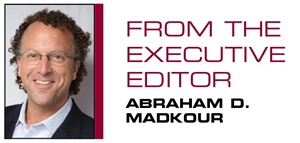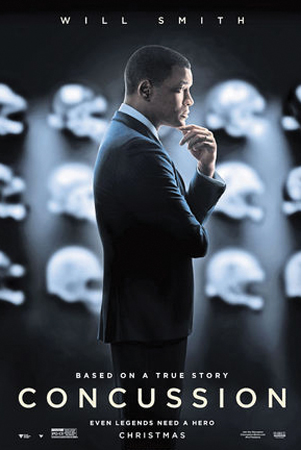The NFL was going to face a major PR crisis from the release of “Concussion.” With a major studio behind it (Sony Pictures) and a box office force (
Will Smith) playing the lead in a story about head trauma affecting players of America’s most popular sport, more than one league insider expressed to me that it was a pending disaster for the NFL — damaging the brand and impeding current efforts toward player safety. Its success would dramatically influence the public’s view of the game and understanding of the issues surrounding player health.
But more than three weeks after the film’s release, that doesn’t seem to be the case. The impact of the film, which cost $35 million to produce, hasn’t been what was anticipated. While critically well-received (80 positive reviews on the Rotten Tomatoes critic meter), it was released during a questionable time period and up against the greatest blockbuster of all time, “Star Wars: The Force Awakens.” The script wasn’t nearly as damning to the sport as some believed it would be. And the NFL followed a smart PR strategy where it didn’t object to the film and stayed on message that its efforts were making the game safer. All those combined to mute the expected impact of this major release.
I saw “Concussion” in a theater sparsely filled with adults. I found that it was well-done and well-acted, despite being slow at times. I found the football narrative compelling; the imagery and messaging disturbing. The portrayal of the NFL was unsurprisingly villainous, with
Roger Goodell (and less so
Paul Tagliabue) seen as vapid and in denial. No new ground was covered, but if you haven’t been keeping up on the coverage, much of this would be new. There was dramatic and creative license taken, but that is expected with Hollywood’s approach to “based on a true story.”
As of late last week, the film had grossed $31 million over an 18-day release. The film opened with a modest $8 million during its opening weekend and has since seen its box office decline to $6.3 million and $2.3 million in the second and third weekends, respectively. Rentrak data indicated the audience for the film was largely 50/50 split among male/female.
The film did not receive any Oscar nominations, so its theatrical release is near the end. My former colleague at SportsBusiness Daily Sean O’Connell has been executive movies editor for CinemaBlend for years, and he was surprised the film didn’t find a larger audience.
“Earning just north of $30 million domestically, following three weeks of release, is good but far from great. And for a Will Smith movie, it’s a disappointment. In addition, a movie based largely on America’s top sport can’t hope to make up its dollars overseas, so this likely is the ceiling for ‘Concussion,’ he said. He noted competition from the giant “Star Wars: The Force Awakens,” as well as “Joy,” “The Big Short,” and “The Revenant,” all fighting for screens. “Sony, and director Peter Landesman, likely are satisfied with the theatrical performance of the film, because it started the conversation,” he said. “I’m sure they think they can continue to build awareness for the film’s message as it transitions to digital and home video release.”
One reason for the tepid return on the film could be in the NFL’s response to the publicity leading up to it. While it was positioned early as a film that would damage the NFL brand, the league didn’t fight it. It was the opposite to how the NFL responded to PBS’s documentary “League of Denial” in 2013. That’s when NFL officials met with ESPN executives, who were collaborating on the project, and voiced concern over the documentary’s portrayal of the league. ESPN backed away from participating on the feature, and that caused “League of Denial” to be perceived as the documentary the NFL didn’t want viewers to see.
With “Concussion,” the league chose not to fight historical battles or be leveraged for free media for the film by publicly criticizing the film’s details. There was the report of an early email exchange between Sony executives and the NFL over content, but both sides acknowledged it didn’t affect the end result. The league kept a disciplined approach of not attacking the plot, preventing any controversial news stories to build. League executives knew if they loudly criticized the film’s merits, it would increase public curiosity about its accuracy, and they weren’t going to supplement Sony’s marketing effort and drive up interest or ticket sales by fighting the project or the likable Smith.
And the movie didn’t suffer from lack of promotion. Sony bought major ad time across all the NFL’s network partners, something the NFL smartly didn’t fight. Dr. Bennet Omalu, whom Smith portrays in the film, wrote a New York Times op-ed under the header, “Don’t Let Kids Play Football.” The film was the No. 1 item on Entertainment Weekly’s “Must List” as a “deeply disturbing story.” Smith was everywhere promoting the film and was on the cover of SI. He refused to take on the NFL, saying time and again, “I’m a football dad.” But he recognized the high profile he was giving to a sensitive issue, saying “I’m not expecting to be invited to the Super Bowl next year.”
The NFL PR machine chose not to engage on any of this. Its talking points seemed to be, “If you want to have a discussion on player safety today, we can. The game is safer.” This approach worked. In addition, because the film hasn’t been a box office hit, the mainstream media hasn’t explored the film’s impact on a larger audience, so the NFL hasn’t had to address the film since its release.
Another aspect that aided the league was the decision by the filmmakers to make it a period piece; more about the life and times of Omalu. Had the film brought the story up to date to the current Goodell administration, which was reportedly an option, it may have been more damaging.
By my count, fewer than 4 million people have watched “Concussion.” For the wild-card weekend, the four games averaged 36.2 million viewers. This Hollywood film did not affect public interest and perception in football, but while “Concussion” may not have caused a massive change in public opinion, O’Connell believes the film and its message will have an impact going forward.
“It can, and it should,” he said. ‘“Concussion’ isn’t anti-football, but it is pro-awareness. Outside of ‘Star Wars,’ it is the film I’m asked about the most by parents who want to know if they should see it, and if they should take their own teenage kids to see. Because ‘Concussion’ isn’t the type of film that demands to be seen on the big screen, I get the sense that audiences are waiting to rent or stream it later — probably in the offseason, when real football games aren’t being played,” O’Connell said. “That’s when Sony can really have an impact with this film. ‘Concussion’ can find new life by reintroducing the talking points raised in the film about player safety and health regulations that should be part of the game.”
Bottom line: The film didn’t have the impact its producers were hoping. The league, through its approach, avoided a massive public backlash. But continued and thoughtful discussion on this serious issue is something all parties — Sony, Smith, Omalu and the NFL — could agree on.
Abraham D. Madkour can be reached at amadkour@sportsbusinessjournal.com.





